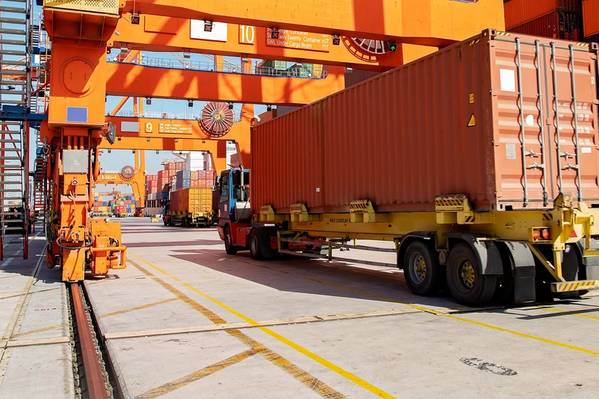
The clean alternative energy source for various port applications
The maritime industry is under pressure from federal regulations and communities when it comes to emissions and environmental impact. While maintaining productivity levels, port authorities must make the most of what’s available to adopt sustainable practices.
Effective and efficient cargo handling equipment (CHE) is a necessity for all port operations. Although diesel has been the mainstay of the port operations for decades, diesel engines emit large amounts of sulfur oxides, nitrogen oxides, and particulate matter, which is forcing many port authorities to look for clean alternative fuel sources—and like so many other industries, they’re feeling a push to go “all electric”. In the rush to go all-electric, the feasibility of electric solutions is often an afterthought. The reality is that the power grid is already fragile and unpredictable, which can hurt a port’s ability to operate throughout all seasons and weather extremes. Plus, electric equipment doesn’t have the same performance capabilities that other energy sources offer. Fortunately, propane is a clean alternative energy source that can power many port applications while being economical, easy to use, and readily available.
San Pedro Bay Ports (SPBP) recently completed a study, the 2021 Update: Feasibility Assessment for Cargo Handling Equipment to analyze low-emission CHE options and how practical it is for ports to implement clean energy sources today. According to the report, there are about 3,368 individual CHE in service at San Pedro Bay Ports alone, about 70 percent of which are yard tractors, top handlers, rubber-tired gantry (RTG) cranes, and large-capacity forklifts. A majority of these are diesel-powered and have been prioritized for replacement with zero- and near-zero emission technologies. The issue: there are limited options for clean CHE replacements.
Based on the parameters of the study, for equipment to be considered for implementation it must be both commercially available and technically viable. Of the yard tractors analyzed, only near-zero emission internal combustion engines (ICE) operating with a clean energy source like propane meet all the criteria while still reducing emissions compared to diesel. The study then analyzed the equipment for operational feasibility, infrastructure and fuel availability, and economic workability. In every category, propane yard tractors outperformed their electric counterparts.
Operational feasibility
ICE yard tractors powered by alternative energy sources such as propane outscored battery electric on all operational fronts—basic performance, fuel economy and endurance, speed, operator comfort and safety, fueling logistics, and maintenance. In fact, as SPBP pointed out, ICE yard tractors are currently the only near-zero emission fuel technology platform capable today of meeting marine terminal operators’ endurance needs—traveling consistent speeds and distances no matter the cargo weight.
Unlike electric yard tractors that can take nearly two hours to fully recharge, propane port tractors can simply fill up at a refueling station and keep moving. Also, propane port tractor fuel levels are easily monitored because they do not require extra power to carry heavy loads. Electric options, on the other hand, require extra battery power to move heavy loads which leads to shorter operation time. Propane is readily available from a local propane supplier, whereas electric batteries must be shipped to the port and require special disposal processes.
Additionally, SPBP found that driver comfort and safety with the propane option is equivalent to diesel yard tractors because they are built on the same basic chassis.
Infrastructure availability
To transition to zero- and near-zero emission energy sources, available fueling and charging infrastructure is essential. According to the study, the storage and refueling station footprint of propane yard tractors is approximately the same as existing diesel refueling pads. Additionally, propane tanks can be installed in various parking and working areas with mobile units for refueling elsewhere in the terminal. The only charging strategy currently available and feasible for electric yard tractors is to implement charging stations at each parking location. However, the infrastructure for each charging site would require new service entrances, significantly affecting the footprint at each site and incurring high utility costs.
Because port terminals typically store fuel in above-ground storage tanks and refuel CHE with mobile units, shelf-stable energy sources like propane are essential. Large ports may even store up to 100,000 gallons of reserve fuel on-site to provide a buffer against supply disruptions. Propane has an indefinite shelf-life, making it a great energy source for backup power and everyday consumption unlike batteries that can lose charge over time.
Economic workability
Utility costs are not the only aspect of battery-electric CHE that plays a role in economic comparisons. Based on research from the study, purchase price for near-zero emission ICE yard tractors is significantly lower than electric tractors at approximately $150,000 in comparison to electric’s $320,000 per unit, not including refueling and recharging infrastructure. Similarly, SPBP noted propane per diesel gallon equivalent is a fraction of an EV charge rate.
Although technology continues to improve year after year, ICE yard tractors meet terminal operators’ needs now and are proving to be more realistic than their electric counterparts when operational feasibility, infrastructure availability, and economic workability are considered. With propane, ports can start cleaning up emissions now while continuing to operate at full capacity.
To learn more about propane at ports, visit Propane.com/ports.




